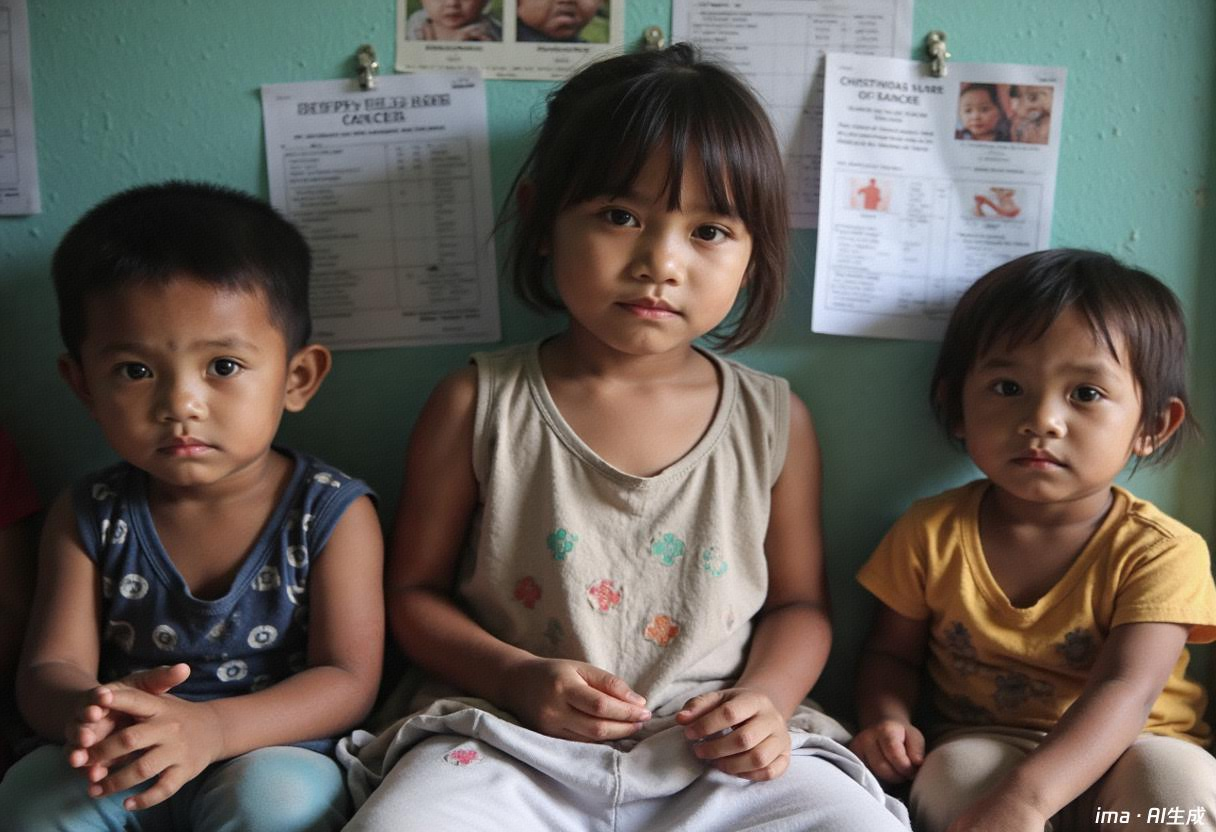Someone Told Me That If a Child Says "I'm Sorry" 100 Times a Day, His Illness Will Get Better
Someone Told Me That If a Child Says "I'm Sorry" 100 Times a Day, His Illness Will Get Better
By: Sunflower Children's Author: Professional Editor: Chen L Date: December 29, 2024
“Have you ever thought about giving up?” I asked Mia, the mother of a child named Alex.
“When my child had his first surgery, I immediately signed my organ donation consent: heart, liver, kidneys, and corneas. Once, while driving him to treatment, I thought to myself, this is just too hard, too hard. What if I closed my eyes and had an accident... I brought him into this world; I have to be there for him. I can't let him be alone. Do you understand what I mean?”
Before the tears fell, she smiled briefly to cover up her emotions.
“The thing I regret the most is that I shouldn't have hit him.”
Alex is a lovely child, but unfortunately, he was diagnosed with a craniopharyngioma at the age of three, a rare brain tumor in children. Although it is a benign tumor with a high chance of cure, because it grows in the critical hypothalamus-pituitary area, both the tumor and the surgery can cause irreversible damage, affecting the patient's quality of life and even their life itself.
The problem with Alex was first noticed during his kindergarten winter break. Mia remembers the last day of school when she picked him up. On the way home, some classmates greeted him, and Alex responded with a “hey,” but then turned around and looked for them, circling around without finding anyone. He clearly heard the voices but couldn't see the people. He was confused: Where is everyone? Mia was puzzled too and pointed out that they were right there.
At home during the break, Alex seemed to be very “disobedient.” For example, he used to complete puzzles quickly, but now he struggled for a long time without managing to fit even a few pieces. It seemed like he was not trying. Mia scolded him harshly, but Alex just sat on the floor quietly searching for pieces. On another occasion, he insisted on lying down to read comic books, holding them very close to his face. No matter what Mia said, he refused to listen. In frustration, she ended up hitting him hard.
This became the thing Mia regretted the most because, at that time, Alex's eyesight was already failing.
During the Spring Festival, Alex and his younger brother were eating small steamed buns. His brother was enjoying them, but Alex couldn't grab a single one. He asked, “Mom, where did my brother get these?”
His parents then realized that Alex had a serious problem with his eyesight.
Top Hospitals and Shamans
They Said He Was Fine
Not daring to delay, Alex's parents immediately made an appointment at a top children's hospital in Beijing, but they faced their first misdiagnosis.
The ophthalmologist lifted the penlight to check Alex's eyes. Alex didn't follow the light, and the doctor said he was being uncooperative. After a series of tests, she found no problems with his eyes. The doctor concluded that the child was too young to cooperate and that there was fundamentally nothing wrong. If there was, it might just be congenital amblyopia, and they should consider further tests with dilation.
Mia followed the doctor's advice and consulted another ophthalmologist, who also said there was no issue. When Mia insisted that Alex's vision was blurry, the doctor dismissed her, saying that blurriness was normal, especially after dilation. Mia insisted that he had been blurry before dilation, and the doctor replied, “Then there’s nothing wrong. We’ve had two professional doctors look at him; you need to trust us! With the pandemic being so serious, you should take your child home and not keep coming to the hospital for no reason!”
Even pediatricians at Beijing's top hospitals did not consider optic nerve atrophy, nor did they think of a brain tumor. Alex missed the first opportunity for a correct diagnosis.
His family did not trust this doctor's judgment and decided they had to see the best specialist. However, they encountered the peak of the pandemic, making it impossible to get an appointment.
During this time, Mia felt extremely lost. She knew her child couldn’t see, but the ophthalmologists kept saying there was nothing wrong. What was really happening?
During the anxious waiting period, various speculations, theories, and rumors emerged.
Some said that if he couldn’t see, the best thing would be to burn glasses at the City God Temple.
Some said that if Alex said “I’m sorry” 100 times a day, his illness would gradually improve.
Some speculated that Alex had developed psychological issues because he had a younger brother, and while his eyes were physically fine, he was “blind in heart” and therefore couldn’t see.
Despite her good education and belief in modern medicine, Mia began to wonder if perhaps there were scientifically unexplainable phenomena, that anything could be possible.
Even the older family members invited shamans and “immortals,” asking them to do all sorts of rituals such as kneeling, burning incense, and chanting spells... the conclusion was always that nothing was wrong.
None of these mystical practices had any effect! There were no signs of improvement in Alex’s condition, and his vision continued to deteriorate.
Bringing Alex to the Hospital
“It Might Be a Brain Problem”
After a full month, Alex's parents exhausted all their options and finally managed to get an appointment at a specialized eye hospital.
This time, the doctor reviewed the previous tests and said that everything was fine. When asked if they should repeat the tests, Mia became anxious and said, “He can’t see! You should try it with him!” The doctor took out a piece of candy, held it up, and asked Alex to walk into the room to get it. Alex walked in, searching the room with his eyes, feeling his way to the doctor’s arms to find the candy. After observing, the doctor’s expression turned serious and said, “Alex’s eyes are beyond the category of amblyopia; it’s a much more serious issue. You should quickly consult a neurologist; it might be a brain problem.”
The neurologist, specialized in a different field, quickly suspected a brain lesion after noticing the tremors in Alex's eyes! They immediately scheduled an MRI for the next day.
The next morning, they conducted the examination. When the imaging results came out, the parents saw the news they feared the most: Alex had a round, walnut-sized tumor in his brain!
The final diagnosis: craniopharyngioma.
Together with his mom and dad, Alex embarked on a long journey of medical treatment.
The More You Know, the More You Fear
With the diagnosis of craniopharyngioma, it was urgent to perform surgery as soon as possible.
Before the operation, the parents spoke with the doctors. Mia said, “I have only one request: you must preserve Alex’s eyesight.” The doctor replied that this couldn’t be guaranteed, as there was indeed a 20% chance of blindness. Mia comforted herself, thinking that they wouldn’t be part of that 20%.
The surgery went very smoothly; in less than four hours, the operating room lights went off. The lead surgeon said the operation was very successful, and the tumor was removed cleanly—it wouldn’t come back!
However, in fact, the doctor’s words did not come true.
Shortly after the operation, Alex’s eyes filled with blood and swelled shut; his vision became increasingly blurry. Soon, he lost all sight in his left eye, and the right eye only retained a little light perception. The 20% chance of blindness became 100% for Alex.
Not only did they fail to preserve his eyesight, but just nine months after the operation, Alex’s tumor recurred.
Mia collapsed.
Before the first surgery, Mia was more confused, unsure of what would happen, but deep down, she felt lucky, believing that things had always gone smoothly for her, and that fate wouldn’t be so harsh on her and her child.
But when Alex had a recurrence, she truly panicked. By that time, she knew everything—about the disease and the risks of surgery. The more she learned, the more she feared everything. She constantly worried, “Can they remove it completely this time? Will my child’s remaining vision be preserved? What if the surgery doesn’t go well?”
Mia felt immense pressure, filled with guilt and self-blame, believing that she had delayed her child’s treatment and had punished him when he couldn’t see, thinking he was just being naughty. She repeatedly thought, if she had been more responsible and discovered it sooner, would it have turned out differently?
The pressure also came from her family. After Alex fell ill, she became the primary caregiver and decision-maker for his medical care and recovery. But when things didn’t go well, although Mia was the most anxious and the most present, she was also the one most often blamed.
The older family members said, “With something this serious, why did you only trust that one doctor? Why didn’t you get more opinions?”
After Alex Lost His Sight
He Had to Rely on Mom for Everything
“Like sunlight piercing through the night,
Dawn quietly sweeps across the horizon.”
After the tumor recurred, whether to perform a second craniotomy became the focus of family discussions.
The older family members advised against another surgery, suggesting they leave it to fate, but Mia couldn’t accept this outcome. However, this time, she didn’t dare to make a decision alone; she realized that anything that might happen in the future needed to be communicated with her husband first, because they would face everything together.
So she shared all the risks of a second craniotomy with her husband and asked, “Should we go through with the surgery this time?”
This time, her husband was particularly resolute: “We must do it! We’ll bear the consequences together.”
This gave Mia the greatest confidence and support. They prepared for the worst, including the possibility of complete blindness for their child, and even the risk of him becoming a vegetable.
Fortunately, the second surgery went very smoothly. After Alex came out, he still had some light perception, and more importantly, he remained very lively.
“The biggest force that kept me going during this time was Alex; he’s just so adorable.”
Alex loves to chat. Although he can barely see, he made many friends in the hospital, including the doctors. He particularly loves talking about Ultraman and would run up to the doctors saying, “You are Ultraman, my idol.” Since he cooperated well during treatment, the doctors also enjoyed talking to him about Ultraman.
Alex always says, “I believe in light.” During his hospital stay, he loved to sing the theme song of Diga Ultraman:
“Like sunlight piercing through the night,
Dawn quietly sweeps across the horizon.
Whose shadow weaves through the cycles of life,
The road to the future lies beneath our feet.
Do not be sad, do not be afraid,
Filled with confidence, look forward to tomorrow.”
Before Alex Went into Surgery
Despite undergoing a craniotomy, being mostly blind, and having a catheter that was uncomfortable, Alex smiled every day. He couldn’t see his mom, so he would play hide-and-seek with her, laughing joyfully when he caught her.
In the hospital, only Mia stayed by his side. When she felt lonely, she couldn’t help but cry, but it was often Alex who came over to comfort her.
“I feel like every day I live in a kingdom of light with him, shielding us from much of the darkness.”
Mia watched as he gradually learned to walk again, from not being able to see to being able to see a little, and as she saw him slowly getting better, she felt incredibly happy. “Isn’t raising a child like this?”
Real Love
Is Accompanying Him Towards Independence and Confidence
After Alex was discharged, he entered a long rehabilitation phase, needing to adapt to a daily life with only a little light and to take medication long-term to compensate for his damaged endocrine function.
Alex’s parents divided responsibilities: the dad focused on earning money, while Mia took care of Alex.
“Some people think that both parents should be involved in raising the child for a harmonious and healthy family. I think that’s too unrealistic. Not everyone can be around to accompany the child every day—are we mining for coal at home? I’m a stay-at-home mom, and while Alex’s dad contributes a lot at work, he really has no time for parenting. Mutual respect is the key.”
In terms of parenting, Mia has her own ideas that even her family does not understand.
Even though Alex’s vision is poor, she insists on cultivating his independence, including continuing his education, learning to use a white cane, and encouraging him to ride a bike and play on a scooter again.
Initially, the older family members opposed this. They questioned whether Mia truly loved her child, wondering how a mother could be so irresponsible and let him fend for himself.
But Mia firmly believes that true love for a child is about accompanying him step by step toward independence and confidence.
Over time, things indeed got better, and the family’s opposition gradually diminished, turning into support. They saw a different Alex and were amazed by the power of life.
Now, Alex
“Giving up early isn’t necessarily a bad thing.
Do you understand?”
Looking back over the past few years, besides the misunderstanding from family, the words of people around Mia also greatly affected her.
Once, during a difficult moment in Alex's condition, due to differing opinions, Mia couldn’t help but have a big fight with her family, storming out in her pajamas and a coat.
On the way, she encountered a police officer who saw her in such a state and took her back to the nearby station, asking if she needed to contact her family. Unable to hold back, Mia cried and poured out everything. After listening, the officer thought for a moment, turned off the camera on his shoulder, and walked over to her, saying:
“You might consider stopping his medication.”
Mia’s skin crawled. Because after Alex’s surgery, he needed to take endocrine medication for a long time, and stopping it would lead to death.
The officer continued, “I don’t mean anything by it, but don’t you have another child? Otherwise, your family will face a heavy burden. I’m saying this for your own good. A relative of mine has a child with a rare disease, and it ultimately ruined the whole family.”
Mia was stunned. She had never thought anyone would suggest such a thing. She just stared at him, unable to utter a word.
“Giving up early might not be a bad thing for the child. Do you know?” He emphasized again.
After what felt like an eternity, she finally managed to squeeze out three words: “I understand.”
To this day, this scene remains etched in Mia’s mind: a police officer turns off the camera on his shoulder and leans in to give her an unimaginable suggestion.
She felt a surge of contradictions within herself: Aren’t police supposed to catch bad people? He seemed to want to help me, but how could he say such a thing?
Perhaps it’s not surprising. Even a police officer might not understand illness, let alone a mother’s love for her child. While doing charity work, I constantly remind myself to be cautious when giving advice as an observer, because every word we say can have unforeseen impacts on patients and their families.
You Can Trust Me, Two Years From Now, You’ll Be a New You
But she also had friends who were very supportive.
During the toughest times, Mia thought of the worst-case scenarios and went to find a friend who sold insurance to buy accident insurance. Her friend was perceptive and quickly noticed that Mia was not okay, so without directly pointing it out, she said: “The insurance company’s rules state that just because you buy insurance doesn’t mean you’ll get a payout if something happens; there’s a waiting period and many investigations.”
Her friend also said that the company’s actuaries have data showing that no matter how difficult people feel at the moment, even if they think about ending their lives, 99% will get through it within two years. “Trust me, every person who has faced setbacks will be a new version of themselves in two years.”
“Honestly, it hasn’t even been two years, and I can see how vastly different things are now. The hardest times will pass,” Mia smiled again, this time sincerely.
If you’re feeling distressed right now, don’t give up; please believe it will pass.
In the end, I expressed my desire to meet Alex, to see this cheerful, lively, and powerful child.
Mia replied, “Not right now. He’s become mischievous and is different from before. You won’t be able to catch him.”
We both laughed because it meant the child had grown up.
On Alex’s birthday, he sang “Grateful Heart.”
While accompanying Alex through his treatment and vision training, Mia initiated “Craniopharyngioma Home” and “Low Vision Alliance,” collaborating with other volunteers and experts to provide help for children and parents affected by craniopharyngioma. We wish all the children a speedy recovery.
Interview & Writing | Li Zhizhong
Layout | Xia Yu
Search
Related Articles

Relaxation Therapy & Peace Care
Jul 03, 2025

Rare Childhood Tumour
Jul 03, 2025

Inflammatory Myofibroblastoma
Jul 03, 2025

Langerhans Cell Histiocytosis
Jul 03, 2025

Angeioma
Jul 03, 2025